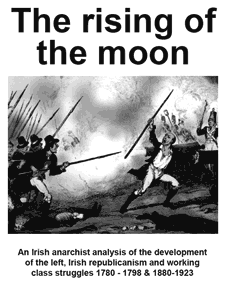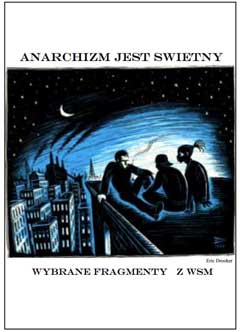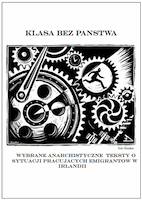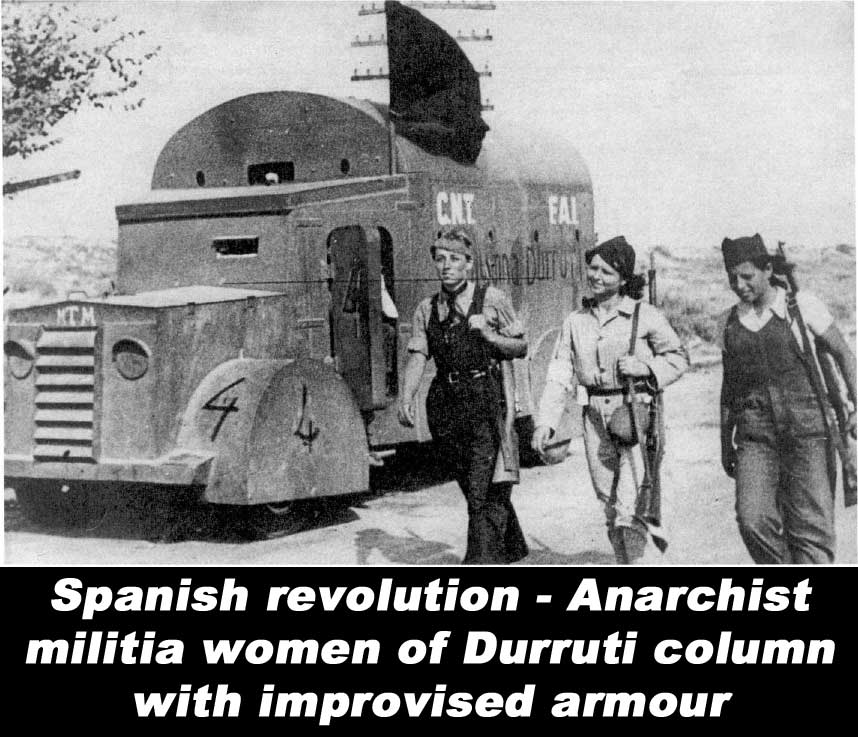Over 30 years of anarchist writing from Ireland listed under hundreds of topics
Pamphlet
Glossary of political organisation names from the Spanish Civil War
CNT (Confederacion Nacional de Trabajo) - anarchist-Syndicalist trade union founded in 1911. The most militant and revolutionary union. Sought to organise all workers into one big union. Based itself on the ideas of anarchism and revolutionary syndicalism.
The rising of the moon
 A collection of Irish anarchist articles on the rebellion of 1798 and the 1916 insurrection brought together in a single 40 page PDF pamphlet which you can download.
A collection of Irish anarchist articles on the rebellion of 1798 and the 1916 insurrection brought together in a single 40 page PDF pamphlet which you can download.
PDF: Anarchizm Jest Swietny
 Broszura ta jest zbiorem tekstow opublikowanych przez WSM - WORKERS SOLIDARITY MOVEMENT, anarcho- komunistyczna organizacje zakorzenion± w tradycji "platformy ". Wybrane teskty dotycza teori i praktyki anarchizmu w nawiazaniu do uniwersalnych zagadnien jak postrzeganie pojecia wolnosci w spoleczenstwie kapitalistycznym a jej znaczenie w ujêciu anarcho-komunizmu.
Broszura ta jest zbiorem tekstow opublikowanych przez WSM - WORKERS SOLIDARITY MOVEMENT, anarcho- komunistyczna organizacje zakorzenion± w tradycji "platformy ". Wybrane teskty dotycza teori i praktyki anarchizmu w nawiazaniu do uniwersalnych zagadnien jak postrzeganie pojecia wolnosci w spoleczenstwie kapitalistycznym a jej znaczenie w ujêciu anarcho-komunizmu.
Klasa bez Panstwa
 Polish translation of WSM texts on immigrant workers
Polish translation of WSM texts on immigrant workers
Broszura ta jest zbiorem publikacji WSM - WORKERS SOLIDARITY MOVEMENT, anarcho- komunistycznej organizacji zakorzenionej w tradycji "platformy".
Sex, Class and Women's Oppression - Anarchist PDF pamphlet
A 14-page pamhlet, made up of compilation of articles from Workers Solidarity. Compiled and edited in 2001.
The Spanish Civil War - A Fresh Revolution - Chapter 4
As said earlier Anarchists are against the state - all states, whether they be liberal democratic, monarchist or totalitarian. Anarchists view the state (the standing army, police, government, bureaucracy) as the organ through which the ruling class maintains its control over the majority of the population. Central to anarchism is the belief that the state must be smashed and replaced by a system based on workers' and community councils. Delegates from each workplace and community would go to regional councils which would then send delegates to a national and, eventually, international council. Delegates would be clearly mandated and all major decisions would be made at assemblies of workers.
Spanish Civil War - The Counter Revolution - Chapter 3
The behaviour of the Spanish Communist Party and the United Socialist Party of a Catalonia (PSUC) had more to do with what was in the best interests of Stalin than what was in the best interests of the Spanish working class. They went out of their way to deny that a revolution had taken place. Then they did all they could to repress this revolution they pretended had not happened. As far as they were concerned the Civil War was only about restoring democracy to Spain. To see why they took this attitude we have to look outside Spain.
Anarchism in Action in the Spanish Revolution - Chapter 2
 Anarchism is a most misunderstood set of ideas. It is constantly portrayed as meaning chaos and violence. Nothing could be further from the truth. Anarchists believe in creating a classless society. They oppose capitalism as a system that puts the profits of a small minority of bosses before the needs of the vast majority. It is a system based on the exploitation of workers, a system that inevitably causes poverty starvation and war. Anarchists oppose authority in the sense of opposing the 'right' of any small minority to have power over everyone else. They oppose the State (meaning government, army, police, courts) as an institution whose purpose is to enforce the will of a minority on the majority.
Anarchism is a most misunderstood set of ideas. It is constantly portrayed as meaning chaos and violence. Nothing could be further from the truth. Anarchists believe in creating a classless society. They oppose capitalism as a system that puts the profits of a small minority of bosses before the needs of the vast majority. It is a system based on the exploitation of workers, a system that inevitably causes poverty starvation and war. Anarchists oppose authority in the sense of opposing the 'right' of any small minority to have power over everyone else. They oppose the State (meaning government, army, police, courts) as an institution whose purpose is to enforce the will of a minority on the majority.
Introduction to Anarchism in Action: The Spanish Civil War
Make a search of all the history books you can obtain. You will find little, if any, mention of Captain Jack White after 1914. It is as if the man who had proposed the formation of the Irish Citizen Army had literally disappeared from the face of the earth when the Dublin Lockout came to an end. In fact he lived on and remained active in the socialist movement until 1940. When James Connolly was sentenced to death it was White who rushed to South Wales and tried to bring the miners out on strike in protest. For that he served three months imprisonment. In England he worked for a time with Sylvia Pankhurst's Workers Socialist Federation, and during the General Strike of 1926 he wanted to organise a Citizen Army to protect the picket lines as he had done in Dublin.

